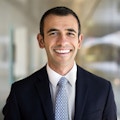Evgueni Filipov, Ph.D.
Associate professor , University of Michigan
Evgueni Filipov is an associate professor in the Department of Civil and Environmental Engineering and the Department of Mechanical Engineering at the University of Michigan. He leads the Deployable and Reconfigurable Structures Lab, where his research is focused on the structural mechanics of thin origami sheets. These unique geometric mechanics are explored and strategically tailored to create deployable, adaptable and functional systems at multiple scales. Through his work, Filipov has created reduced-order analytical models to simulate the mechanics and multi-physics of origami in various scenarios. His research has created origami designs that are stiff and lightweight to enable large-scale origami for applications in civil engineering and architecture. His work has also explored fabrication of functional micro-origami for sensing, robotics and testing of miniature matter.
Filipov holds M.S. and Ph.D. degrees in civil engineering from the University of Illinois at Urbana-Champaign and a B.S. from Rensselaer Polytechnic Institute. At the University of Michigan, he teaches classes in mechanics, structural dynamics, and deployable and adaptable structures. He has received the ASCE EMI Leonardo da Vinci Award (2023), the NSF CAREER Award (2020), the DARPA Young Faculty Award (2018), the Cozzarelli Prize from the National Academy of Sciences (2015) and an NSF Graduate Research Fellowship.
Research Blurb
Evgueni Filipov’s current research has focused on the mechanics of thin origami sheets to create deployable, adaptable, and reconfigurable structures. Through the Simons Foundation Pivot Fellowship, he will enter the field of biomaterials where he will explore regenerative infrastructure made by growing mycelium fungus within a knitted fabric scaffold. He plans to explore the growth of mycelium hyphae (root) networks and their mechanical interactions with substrate materials and the kitted fabrics. He will characterize the fundamental mechanics of these biohybrid systems as they grow, strengthen, fail, and self-heal over their lifecycle. Filipov will also create mechanics-based models to simulate, design and optimize the behavior of biohybrid systems. Ultimately this effort will create low-cost regenerative infrastructure with a small CO2 footprint that can grow, strengthen, regrow and self-heal over time.